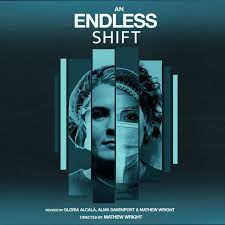Afterwards, in the car, the Lovely Bride said, "What were those books we had, the ones in which there were collections of interviews about jobs and World War II?"
I responded "The books were "Working" and "The Good War", by Studs Terkel." He compiled a lot of interviews on these subjects (and other subjects as well), edited them, and published them as oral histories.
And An Endless Shift works off the same principle. The three devisers (as opposed to playwrights) interviewed five health care professionals (four nurses and a respiratory technician) about their experiences during the pandemic. The endless shift of the title is both a reflection of the long hours and relentless pressure during the worst of the pandemic, and the shifting opinions on them as the crisis dragged on, from surprise to fear to support to doubt to hostility from some of the same people they were trying to save.
The performance in one-woman, five characters, five chairs on the stage. Gloria Alacal, one of the devisers is the actor, supported by audio clips of both the news of the day and the women interviewed. And she does a good job, though some of her characters tend to blend and blur in the single-person retelling (I had some trouble telling apart when she was the older African American nurse. and the younger gay male nurse). And there is some repetition in tying it all together at the end, but it holds the (mostly masked) audience for the length of the performance.
And the play provides a narrative approach to the entire mess of the past three years. We've been buffeted by events and discoveries and reverses and politics. Particularly politics. As we move forward, figuring out what happened and why will be a big chunk of our history of these times, and the living record of those who went through it on the front lines will be a big part of that.
Ultimately as a performance? It's good, and can be better. Yes, the devisers are relaying the words and experiences of their subjects, but they are also choosing the questions and choosing which responses to present and in what order. Terkel presented himself as an author, and Alcal, Davenport, and Wright are similarly empowered to do so. The performance itself needs some editing (I thought we reached the end about three times), yet it was a powerful statement in the words of those that were boots on the ground at the center of this maelstrom.
More later,
